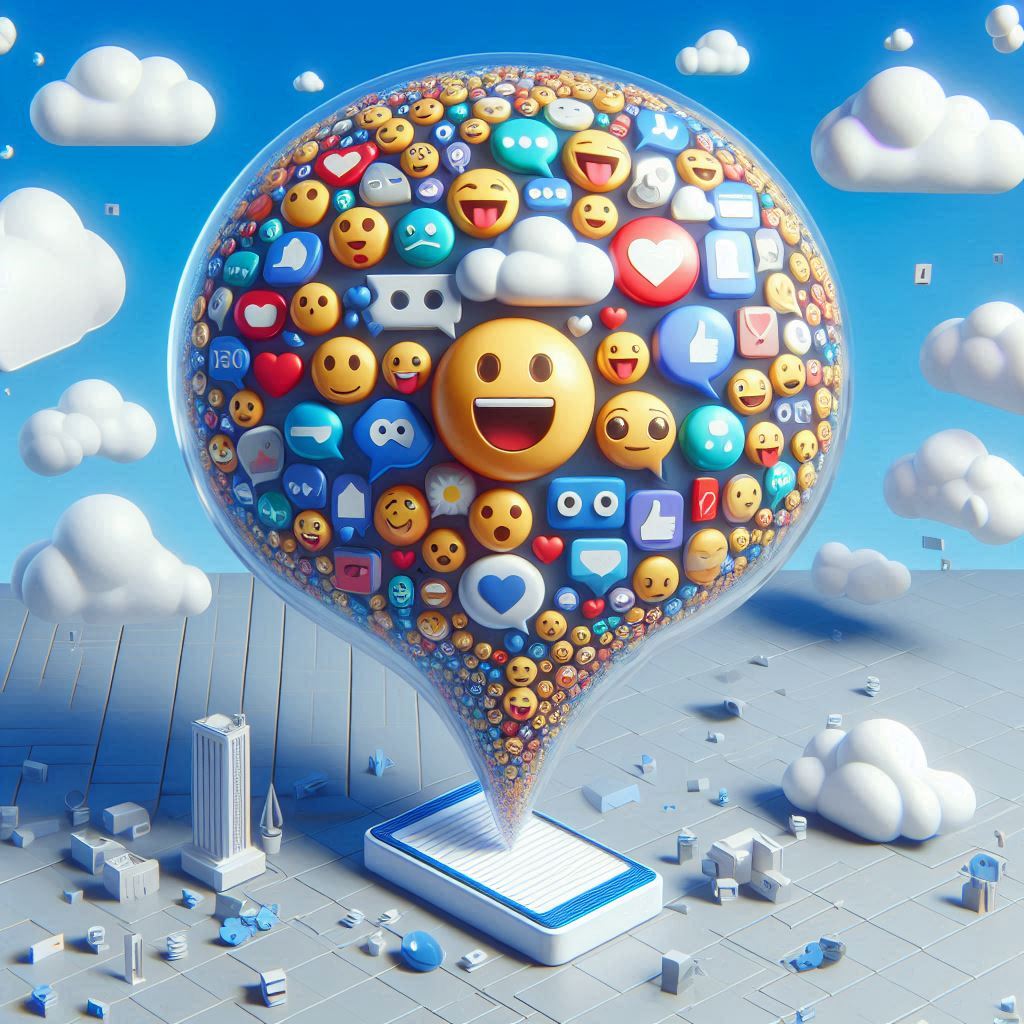In celebration of Social Media Kindness Day, (and having lived through the 2024 United States presidential election), I reflect on the power of kindness in our increasingly interconnected digital world. In an era marked by global unrest, political divisions, and the constant barrage of information, and misinformation, the need for compassion and understanding has never been more critical. My journey to understand and promote kindness, especially in our online interactions, has been shaped by personal experiences that have profoundly impacted my perspective.
The Art of Dignified Disagreement
Many years ago, while traveling by train between two cities in the UK, I witnessed an interaction that left an indelible mark on my understanding of constructive dialogue. Two gentlemen seated nearby were engaged in an intense discussion, but what struck me was the dignified and “kind” manner in which they disagreed.
Their approach was a masterclass in respectful communication. Instead of stating, “I disagree,” they used phrases like, “But wouldn’t you agree that…?” This subtle shift in language invited the other person to consider an alternative perspective rather than dismissing their viewpoint outright. It was a revelation – a demonstration of how disagreement could be both passionate and courteous. This experience highlighted the importance of tone and phrasing in our interactions. This principle applies equally to our online communications.
The Paradox of Being Right
In my recent reading of Kathryn Schulz’s thought-provoking work “Being Wrong: Adventures in the Margin of Error,” I’ve been struck by a profound insight that directly relates to our online interactions. We move through life with an almost unshakeable conviction that we’re right about nearly everything – our political stances, our memories, our understanding of scientific facts, and even our judgments of others. This certainty, while comforting, often becomes the very barrier that prevents meaningful dialogue and understanding.
What fascinates me most is what Schulz calls the “Heisenberg Uncertainty Principle of Error” – the notion that we can be wrong, or we can know we’re wrong, but we can’t experience both states simultaneously. The moment we recognize our error, we’ve already shifted our perspective. This insight has transformed how I approach online discussions and disagreements.
Reflecting on my own experiences moderating panels and hosting discussions, I’ve observed how this “rightness” addiction plays out in real-time. When people engage in heated social media debates, they’re often not just defending ideas – they’re defending their very sense of being right. This attachment to correctness can turn what could be enriching discussions into bitter arguments, especially in the rapid-fire environment of social media.
This understanding has deepened my appreciation for that train conversation I witnessed in the UK. Those gentlemen weren’t just being polite; they were demonstrating something far more profound – the ability to hold their convictions while remaining open to the possibility of being wrong. Their approach wasn’t about winning or being right; it was about exploring ideas together.
Such intellectual humility and the art of exploring ideas together is what initially sparked my enthusiasm to return to graduate school a few years ago. I had romantic notions of what awaited me – visions of passionate yet respectful debates, the kind of intellectual discourse that characterized my earlier academic experiences decades ago. However, what I encountered was strikingly different and, frankly, concerning.
Instead of finding an environment that fostered the exploration of ideas and intellectual curiosity, I witnessed something that mirrored the very challenges we face in our broader social media landscape. Even within the supposedly hallowed halls of academia, I found deep divisions, entrenched “camps” of thought, and an alarming level of hostility in what should have been scholarly discourse. Recently I watched in dismay as classmates hurled vitriol at each other in our graduate class WhatsApp group discussions about political views – not engaging in the exchange of ideas or demonstrating any semblance of intellectual humility, but rather exemplifying the very righteousness that Schulz warns against in her work.
This experience served as a powerful reminder that no space – not even academic institutions – is immune to the polarization and certainty addiction that characterizes much of our current digital discourse. It also reinforced my conviction that we must actively work to create environments, both online and offline, where the exploration of ideas can flourish without the threat of hostility or the pressure to conform to ideological camps.
The Impact of Kindness on Social Media
Social media platforms have become integral to our daily lives, shaping how we communicate, share information, and perceive the world. While these platforms offer unprecedented connectivity, they can amplify negativity and foster division. However, we can create a more positive and supportive digital environment by consciously choosing kindness in our online interactions.
Research has shown that acts of kindness benefit both the giver and the receiver. Engaging in kind behaviors activates the brain’s reward system, releasing neurochemicals such as dopamine and oxytocin, which contribute to feelings of happiness and well-being. By extending this kindness to our online interactions, we can improve our mental health and that of others in our digital communities.
The Challenge of Truly Listening in the Digital Age
In my years as an interviewer, podcast host, and panel moderator, I’ve learned a crucial lesson that applies powerfully to our digital interactions: the art of active listening. Too often, especially in the fast-paced world of social media, we fall into the trap of listening to respond rather than listening to understand.
In the speed of day-to-day interactions, I’ve caught myself formulating my response before the other person has finished expressing their thoughts. This habit, while common, can be a significant barrier to genuine understanding and meaningful communication.
We’re often so attached to our own ideas and beliefs that we fail to truly appreciate what someone else is saying. We’re more interested in being understood than in understanding. This attachment to our own perspective can blind us to the valuable insights and experiences others bring to the conversation.
A profound quote perfectly captures this idea: “Seek first to understand, then to be understood.” While its origin is debated, it’s often attributed to Stephen Covey. This quote encapsulates the essence of active listening, which is at the heart of creating kinder, more empathetic digital spaces.
When we practice active listening in our online interactions – taking the time to fully absorb and consider someone’s words before crafting our response – we open ourselves to new perspectives and foster a more compassionate digital environment. It’s about creating a space where ideas can be exchanged freely and respectfully, where disagreements don’t devolve into hostility, and where every voice feels valued.
Practical Ways to Spread Kindness Online
Building on the previous suggestions, here are additional ways to foster kindness and understanding in our digital interactions:
- Practice Active Listening: Before responding to a post or comment, take a moment to ensure you’ve fully understood the other person’s perspective.
- Pause Before Responding: Give yourself time to process information and formulate a thoughtful response rather than reacting immediately.
- Ask Clarifying Questions: If something isn’t clear, ask for clarification instead of making assumptions.
- Acknowledge Others’ Viewpoints: Even if you disagree, show that you’ve heard and considered their perspective.
- Practice Dignified Disagreement: Use inviting language that encourages dialogue rather than confrontation.
- Apply Nonviolent Communication: Focus on observations, feelings, needs, and requests in your online interactions.
- Amplify Positive Voices: Share uplifting content and compliment others on their achievements.
- Support Meaningful Causes: Use your online presence to raise awareness for critical social issues.
The Ripple Effect of Online Kindness and Understanding
Combining kindness with active listening and a genuine attempt to understand others creates a powerful ripple effect in our digital communities. This approach fosters more meaningful connections and opens up opportunities for learning and growth. By setting aside our preconceptions and genuinely engaging with diverse perspectives, we enrich our understanding of the world and inspire others to do the same.
A Personal Call to Action
As a leader in the digital marketing space and someone who has experienced the transformative power of kind and attentive communication, I feel a profound responsibility to champion these principles in our online interactions. Molière’s humorous lament, “It infuriates me to be wrong, when I know I am right,” captures perfectly the paradox we all face in our digital discourse. As Schulz astutely observes, being wrong feels exactly like being right – until the moment we realize we aren’t.
Perhaps the most challenging aspect of our online interactions is what Schulz describes as “a tug-of-war over who possesses the truth.” We exhaust ourselves fighting for the right to be right, when we could instead be engaging in meaningful dialogue that enriches our understanding and perspectives.
Social Media Kindness Day is more than just a date on the calendar; it’s an opportunity to release our grip on this need to be right. I challenge everyone to approach their online interactions with a spirit of openness and genuine curiosity. Before you type that quick reply or share that reactive post, pause and ask yourself: Am I seeking to understand, or am I just trying to prove I’m right?
Remember, in a world where you can be anything, choose to be kind. After all, being wrong feels exactly like being right.
*Image created using OpenAI’s DALL-E



